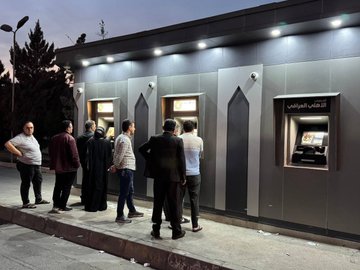AMERICAN EYES LOOK AT “RAFIDAIN BANK”.. SMUGGLING DOLLARS TO IRAN MAY LEAD TO SANCTIONS AND “ECONOMIC COLLAPSE”
American eyes are turning towards the government-owned Rafidain Bank and demanding that sanctions be imposed on it, describing it as a “window for smuggling dollars to Iran,” while politicians and academics do not view the matter with optimism, especially since any impact on the bank will cause financial tensions within Iraq, as it is one of the most important government banks.
Republican Representative Joe Wilson, in a post on his X account, called on the US Treasury Department to impose sanctions on the official Iraqi Rafidain Bank, which he said was “smuggling huge sums of money to Iran.”
“Maximum pressure on Iran means maximum pressure on Iraq. Start with Rafidain Bank,” Wilson said, addressing the US Treasury, saying, “Stop allowing Iraqi militias and the Iranian regime to smuggle $500-600 million a month from the largest bank in Iraq,” stressing that “Trump will fix it.”
With Donald Trump in the White House, politicians and experts are warning of the danger of imposing any American sanctions on the Iraqi banking system in the coming period, especially the “Rafidain Bank”, as there is a possibility that Iraq will witness “catastrophic results” if sanctions are imposed, after the circulation of a memorandum issued by the American presidency, stressing the need to tighten the noose on Iran, followed by American political calls to stop funding to Iraqi entities and impose sanctions on banks, most notably the government-owned Rafidain Bank, which is accused by an American representative of sponsoring the smuggling of money to Iran and armed factions loyal to it.
What if sanctions are imposed?
“Imposing any American sanctions on the Iraqi banking system, the official government one, will have serious and major repercussions on the stability of the economic and financial situation in Iraq,” banking and financial expert Nawar Al-Saadi told Al-Jabal platform on Thursday, noting that “this will lead to a significant increase in the dollar exchange rate, and will also prevent many foreign investment opportunities in various sectors. Therefore, these American sanctions and threats of them will cause a near collapse of the Iraqi economic situation.”
The banking expert added that “these sanctions will have an impact on raising the budget deficit as well as the difficulty of obtaining cash liquidity to provide employees’ salaries, especially since Iraqi oil is sold and the money from the sale is placed in American banks and then transferred to Iraq. If these sanctions are imposed, America will prevent or delay sending these funds,” noting that “here, Iraq will enter a dangerous financial crisis, the most dangerous in its history, and therefore the sanctions on the Iraqi banking system are dangerous, and their results differ from imposing sanctions on some private banks, as happened previously.”
“CATASTROPHIC RESULTS”
On the other hand, the Finance Committee in the Iraqi Parliament confirmed that “catastrophic results” would occur if the United States imposed any sanctions on the Iraqi banking system.
Committee member Mustafa Al-Karawi said in an interview with Al-Jabal that “the economic and financial situation in Iraq could collapse if the United States of America imposes any sanctions on the Iraqi banking system, as this will have truly catastrophic consequences.”
Al-Karawi explained that “until now, there is no official American move to impose such sanctions on the Iraqi banking system, and what has been issued is merely a threat and intimidation, perhaps for the purpose of pressuring specific issues and files, but at the same time, these threats must be taken seriously, and Iraqi diplomacy must move to prevent such decisions that have disastrous consequences on Iraq’s financial and economic situation.”
“PUNITIVE MEMO”
On Tuesday, February 4, the White House published a presidential memorandum on US national security, which included in part tightening sanctions on Iran, as the memorandum directed to “maintain countermeasures against Iran within the framework of the Financial Action Task Force, evaluate ownership thresholds to ensure that Iran is denied all potential illicit proceeds, and evaluate whether financial institutions should adopt the Know Your Customer (KYC) standard for transactions related to Iran in order to further prevent sanctions evasion.”
Also, “take immediate steps, in coordination with the Secretary of the Treasury and other relevant agencies, to ensure that Iran does not use the Iraqi financial system to evade or circumvent sanctions, and that the Gulf States are not used as a remittance point to evade sanctions.”
A MAJOR AMERICAN SHIFT
Political analyst Aqil Abbas said, “What is happening now is a major shift in the American approach to Iraq, considering this country as part of the Iranian axis and treating it as an adversary, but in an undeclared manner.”
Abbas said in an interview with the “Al-Jabal” platform in this regard that “the presidential memorandum stated that the Iraqi banking system should be prevented from smuggling money to Iran,” noting that “in normal administrations, America does not announce something like this publicly and in a memorandum of a punitive nature, but rather communicates through political and diplomatic channels, and the pressure is from behind the scenes. Now the matter has become public, Iraq will no longer enjoy the previous advantage of a friend, to obtain exemptions regarding oil and others regarding electricity, or to work with its government to develop its ability to be independent from Iran.”
He explained that “this time Washington classifies Iraq as an ally of Iran and is going directly to economic sanctions, and this could even include the Central Bank of Iraq, and a real disaster will happen to Iraq if things go in this direction, and this is very possible.”

